Russia has initiated aggressive hybrid offensive actions against Moldova, according to official reports
In the heart of Eastern Europe, the small nation of Moldova finds itself at the centre of a complex geopolitical battle. Russia, with its doctrine of war-making that involves methods other than direct hostilities, is conducting hybrid attacks against Moldova's government and EU membership aspirations.
These attacks are a sophisticated blend of cyber, political, and military tactics designed to destabilize Moldova and sow doubt about its democratic institutions. Key tactics include disinformation campaigns, cyberattacks, sabotage, and political interference. Coordinated public protests, vote buying, flooding social media with disinformation—often AI-generated—and cyberattacks on critical IT infrastructure are all part of Russia's arsenal.
Recent analysis points to Russian-associated hacker groups like “Curly COMrades” conducting stealthy espionage operations within Moldova, further illustrating the multi-faceted nature of Russia’s hybrid tactics. These groups prioritise long-term access and data exfiltration with minimal detection.
Moldova's Deputy Prime Minister, Kristina Gerasimov, has thanked countries like Latvia for their support. In a recent meeting with Latvia's Foreign Minister, Baiba Braze, Gerasimov discussed Moldova's security challenges and Moldova's aspirations to become an EU member state. Braze expressed support for Moldova's political will to join the EU.
Latvia is providing practical assistance to Moldova, including training for EU negotiations, strengthening energy infrastructure, and support for the agricultural sector. Braze also indicated that Latvia will support Moldova in holding fair elections again this year.
Moldova wants to learn good practices from Latvia, particularly in areas such as critical infrastructure, communication technologies, and digitalization. This exchange of knowledge is crucial for Moldova as it prepares for its parliamentary elections at the end of September.
The attacks are aimed at undermining public trust in the Moldovan government, European institutions, and Moldova's future in the European Union (EU). However, Moldova has managed to resist Russian influence in the last presidential elections. This resilience, coupled with the support from countries like Latvia and the EU, gives hope for a secure and prosperous future for Moldova within the EU.
The European Union and NATO, along with Moldova’s government, are actively condemning and countering these hybrid threats by enhancing cybersecurity measures, exposing disinformation campaigns, imposing restrictive sanctions on Russian operatives, and providing political and technical support to Moldova. The EU emphasises that Russia’s hybrid campaigns have escalated since the invasion of Ukraine and are likely to persist. These campaigns extend beyond cyberattacks to include physical sabotage, information manipulation, and interference in democratic processes across Eastern Europe.
In summary, Russia’s hybrid war on Moldova is a complex and ongoing struggle. But with coordinated European and NATO countermeasures focused on resilience, cybersecurity, and political solidarity, and the determination of Moldova's government and people, there is hope for a secure and prosperous future for Moldova within the EU.
- The energy sector in Moldova is a potential target for Russia's hybrid attacks, as shown by their emphasis on sabotage and interference in critical IT infrastructure.
- The general news in Moldova is filled with crime-and-justice stories, as Russian tactics include conducting stealthy espionage operations within Moldova and AI-generated disinformation campaigns to sow doubt and undermine public trust.





